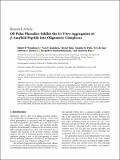Oil Palm Phenolics Inhibit the n Vitro Aggregation of β-Amyloid Peptide into Oligomeric Complexes
Author(s)
Tan, Yew Ai; Sambanthamurthi, Ravigadevi; Weinberg, Robert P; Koledova, Vera V; Shin, Alice Hyeari; Park, Jennifer; Sinskey, Anthony J; Rha, Chokyun; ... Show more Show less
DownloadIJAD.2018.7608038.pdf (2.044Mb)
PUBLISHER_CC
Publisher with Creative Commons License
Creative Commons Attribution
Terms of use
Metadata
Show full item recordAbstract
Alzheimer’s disease is a severe neurodegenerative disease characterized by the aggregation of amyloid-β peptide (Aβ) into toxic oligomers which activate microglia and astrocytes causing acute neuroinflammation. Multiple studies show that the soluble oligomers of Aβ42 are neurotoxic and proinflammatory, whereas the monomers and insoluble fibrils are relatively nontoxic. We show that Aβ42 aggregation is inhibited in vitro by oil palm phenolics (OPP), an aqueous extract from the oil palm tree (Elaeis guineensis). The data shows that OPP inhibits stacking of β-pleated sheets, which is essential for oligomerization. We demonstrate the inhibition of Aβ42 aggregation by (1) mass spectrometry; (2) Congo Red dye binding; (3) 2D-IR spectroscopy; (4) dynamic light scattering; (5) transmission electron microscopy; and (6) transgenic yeast rescue assay. In the yeast rescue assay, OPP significantly reduces the cytotoxicity of aggregating neuropeptides in yeast genetically engineered to overexpress these peptides. The data shows that OPP inhibits (1) the aggregation of Aβ into oligomers; (2) stacking of β-pleated sheets; and (3) fibrillar growth and coalescence. These inhibitory effects prevent the formation of neurotoxic oligomers and hold potential as a means to reduce neuroinflammation and neuronal death and thereby may play some role in the prevention or treatment of Alzheimer’s disease.
Date issued
2018-01Department
Massachusetts Institute of Technology. Biomaterials Science and Engineering Laboratory; Massachusetts Institute of Technology. Department of BiologyJournal
International Journal of Alzheimer's Disease
Publisher
Hindawi Publishing Corporation
Citation
Weinberg, Robert P., et al. “Oil Palm Phenolics Inhibit the In Vitro Aggregation of β -Amyloid Peptide into Oligomeric Complexes.” International Journal of Alzheimer’s Disease, vol. 2018, 2018, pp. 1–12.
Version: Final published version
ISSN
2090-8024
2090-0252